
Can Dogs Have Banana?
|
|
Time to read 10 min
|
|
Time to read 10 min
In this article, we will explore the following topics about banana:
Dogs can benefit from the occasional treat of a banana in moderation. Bananas are not toxic to dogs, and they can provide a variety of nutritional benefits (O’Connor, et al, 2022). Rich in potassium, fiber, and vitamins like B6 and C, bananas can be a healthy addition to a dog's diet.
It's crucial to remember that bananas should only be given as a snack and not as a primary meal replacement. Too much banana consumption can lead to digestive issues in dogs due to their high sugar content.
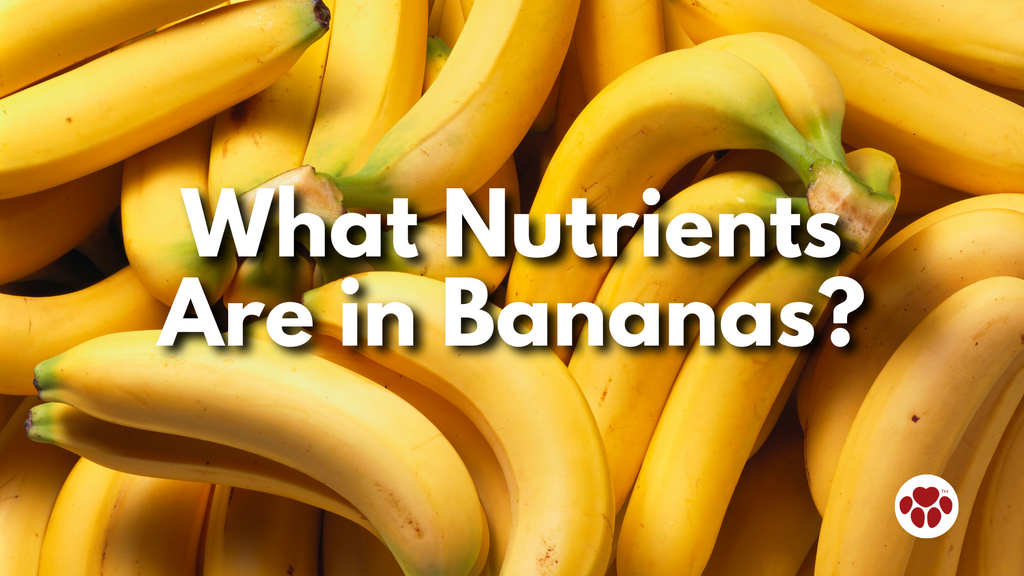
Bananas are packed with essential nutrients that can benefit dogs, including fiber, potassium, and various vitamins and minerals that support a healthy diet.
Fiber is crucial for digestive health and promoting regular bowel movements in dogs. Bananas are rich in carbohydrates, providing energy and dietary fiber, with the peel containing a higher fiber content (Singh, et al, 2016; Sidhu and Zafar, 2018).
Potassium plays a vital role in maintaining proper muscle function and heart health. The fruit is one of the best sources of potassium, fulfilling a significant portion of the daily recommended value (Singh, et al, 2016; Netshiheni, et al, 2019).
Bananas contain enriching vitamins such as Vitamin C and Vitamin B6, which contribute to a strong immune system and essential enzyme function, respectively. Essential amino acids such as leucine, valine, phenylalanine, and threonine are present in significant quantities in banana peels, with lysine being the limiting amino acid (Emaga, et al, 2007; Pereira and Maraschin, 2015).
Bananas are also rich in bioactive compounds such as phenolics, carotenoids, biogenic amines, and phytosterols, which have antioxidant activities and health benefits (Ranjha, et al, 2020; Sheng, et al, 10).
Banana flowers also contain dietary fiber, proteins, and a higher composition of unsaturated fatty acids, mainly linoleic acid. The content of vitamin E, total saponin, and flavonoids in banana flowers suggests a fundamental nutritional value (Pereira and Maraschin, 2015).
Varieties of bananas show differences in β-carotene content, with some cultivars being particularly rich in this nutrient, which is important for vitamin A synthesis (Arora, et al, 2008).
Depending on the specific nutrient need of your dog, you can give an unripe or ripe banana. The ripening process of bananas involves an increase in soluble sugar content and a decrease in starch content (Emaga, et al, 2007; Kayisu, Hood, Vansoest,1981).
By incorporating bananas into a dog's diet, pet owners can provide a natural source of these essential nutrients, helping to support their furry friend's overall well-being.
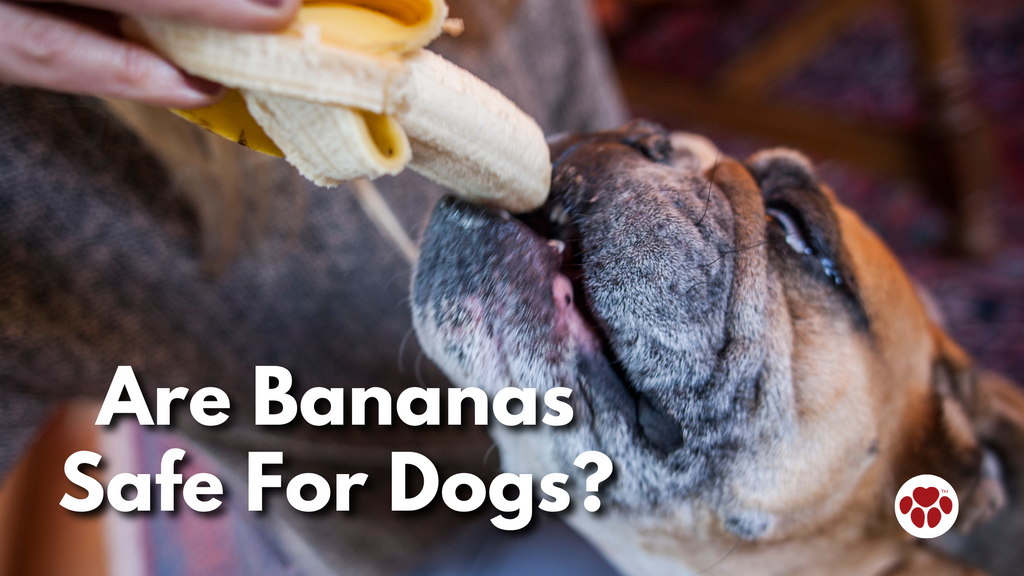
Regarding feeding bananas to dogs, safety is crucial. While bananas themselves are generally safe for dogs, certain precautions need to be taken to avoid potential gastrointestinal issues (O’Connor, et al, 2002).
One important safety consideration is to remove the peel before offering bananas to your furry friend, as banana peels can be a choking hazard and may also cause digestive blockages.
It is crucial to ensure that the bananas are ripe and not overly green, as unripe bananas can be difficult for dogs to digest and may lead to constipation.
Feeding bananas to dogs can pose certain risks, particularly in relation to gastrointestinal problems. The high sugar content in bananas may lead to issues such as constipation or diarrhea if consumed in excess (Emaga, et al, 2007; Kayisu, Hood, Vansoest,1981).
While bananas are generally considered safe for dogs in moderation, feeding them too many can result in digestive disturbances. Dogs have different digestive systems compared to humans and may struggle to break down large quantities of sugars.
It is essential for pet owners to monitor their dog's intake of bananas and other high-sugar fruits to prevent potential stomach upset (Hermansen, et al, 1992). If a dog experiences any symptoms like vomiting or bloating after eating bananas, it is advisable to consult a veterinarian immediately.
Recognizing the symptoms of a banana allergy in dogs is essential for their well-being. However, banana allergy in canines is a topic that has been explored in the context of human allergies, particularly focusing on the cross-reactivity between banana and other allergens such as latex and pollens (Mäkinen‐Kiljunen, 1994).
Common symptoms of a banana allergy in dogs may include itching, skin rashes, digestive issues like vomiting or diarrhea, and in severe cases, difficulty breathing (Arnold, 2022). If you notice your canine companion experiencing any of these symptoms after consuming bananas, it is advisable to consult a veterinarian promptly.
Managing banana allergies in puppies or adult dogs involves eliminating bananas from their diet and opting for alternative treats that are safe and suitable for their sensitive stomachs. It's crucial to read ingredient labels carefully to avoid accidental exposure to bananas in commercial dog foods or treats.

While bananas can be a healthy snack for dogs, it's important to feed them in moderation and consider the quantity being offered. For most dogs, it is recommended to offer bananas as a treat rather than a staple in their diet.
A good rule of thumb is to limit banana consumption to small portions, about 1 to 2 small slices per day for smaller breeds, and up to half a banana for larger dogs. A balanced diet is key, so ensure bananas are complementing your dog's primary food. To add variety, you can mix small banana slices with their regular meals or offer it as a separate snack during the day.

Feeding bananas to dogs can offer various health benefits, as they are rich in vitamins, minerals, and nutrients that support energy levels, skin health, and coat maintenance. They are also an excellent source of potassium.
The high fiber content in bananas aids in digestion and can help regulate bowel movements in dogs, promoting gastrointestinal health. Bananas can also be a part of a protein-limited diet for anemic dogs (Hahn and Whipple, 1939). Check "CBD for your Dog's Upset Stomach".
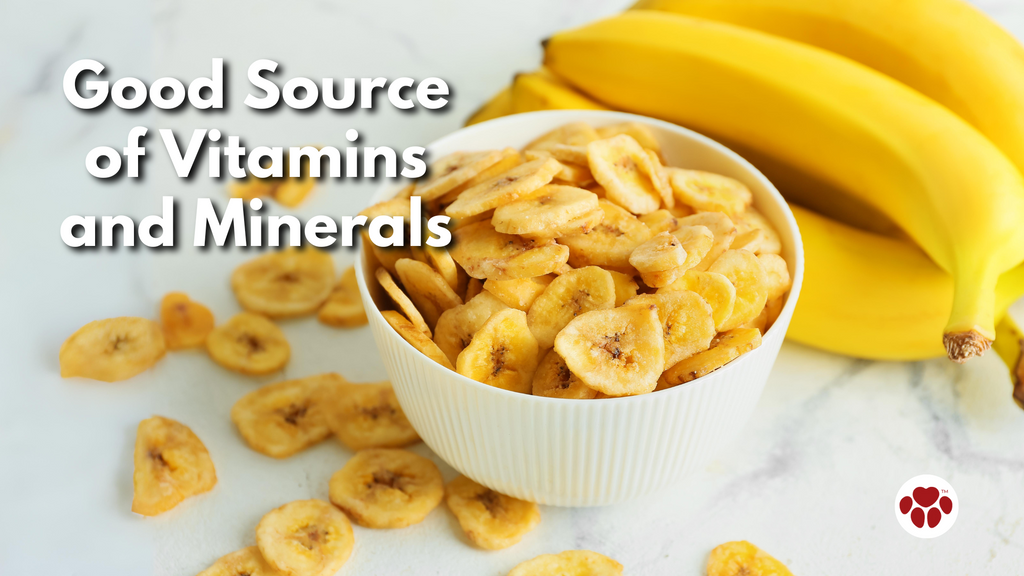
Bananas are rich in potassium which aid in maintaining proper muscle and nerve function in dogs, while also supporting heart health. They contain vitamin C, an important antioxidant that boosts the immune system and helps in collagen formation for healthy skin and coat. Bananas also provide vitamin B6, which is beneficial for metabolism and cognitive function in dogs.
The natural sugars in bananas offer a quick energy boost, making them a great snack option before a long walk or an active play session (Kayisu, Hood, Vansoest,1981). Also, potassium plays a crucial role in maintaining proper muscle function and electrolyte balance, which is essential for overall energy levels (Netshiheni, et al, 2019).
Bananas are rich in vitamin B6 as well, which aids in converting food into energy and supporting a healthy nervous system. Incorporating bananas into a dog's diet provides a convenient and tasty way to enhance your dog’s energy levels.
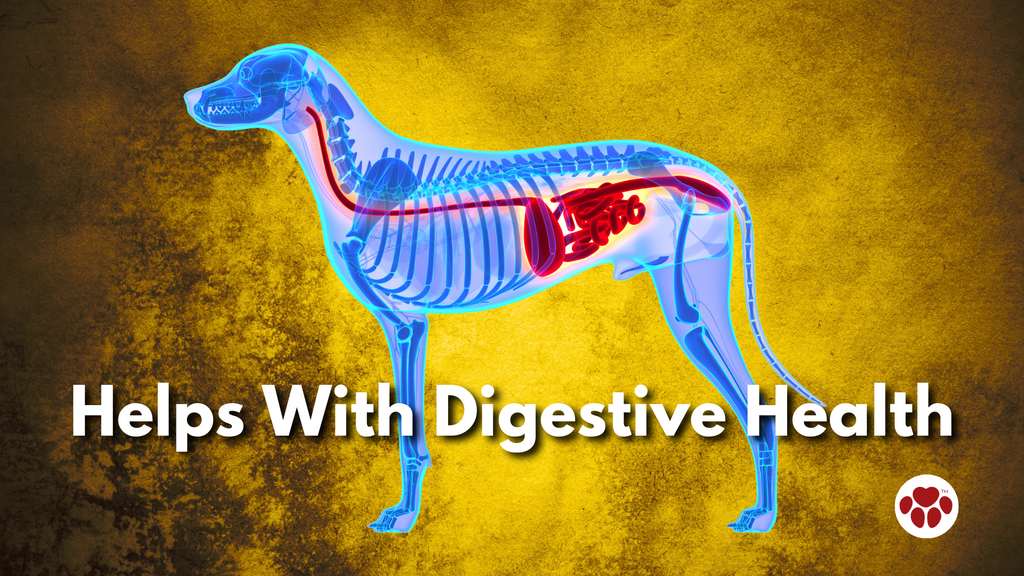
Bananas can aid in maintaining digestive health for dogs, primarily due to their fiber content (Rodríguez-Ambriz, 2008) that supports smooth digestion and bowel regularity.
Fiber plays a crucial role in a dog's gastrointestinal health as it helps in the absorption of nutrients, regulation of bowel movements, and the maintenance of a healthy gut flora.
Additionally, bananas contain pectin (Brady, 1976), a soluble fiber that acts as a prebiotic, nourishing the beneficial bacteria in the intestines and promoting a balanced digestive environment. This can help reduce the risk of digestive issues such as constipation, diarrhea, and irritable bowel syndrome in dogs.

Feeding bananas to dogs can contribute to promoting healthy skin and a glossy coat, as bananas contain essential nutrients and vitamins (Singh, et al, 2016) that support skin and coat health.
Bananas are rich in vitamin B6 (Cruz, et al, 2021), which plays a crucial role in maintaining the overall health of a dog's skin and coat. This vitamin helps in producing keratin, a protein that keeps the skin and coat strong and healthy.
The antioxidants in bananas (Alothman, Bhat, and Karim, 2009) help combat free radicals that can damage skin cells, leading to a dull coat or skin irritation. Including bananas in a dog's diet may also improve hydration levels, resulting in a more supple skin and coat.
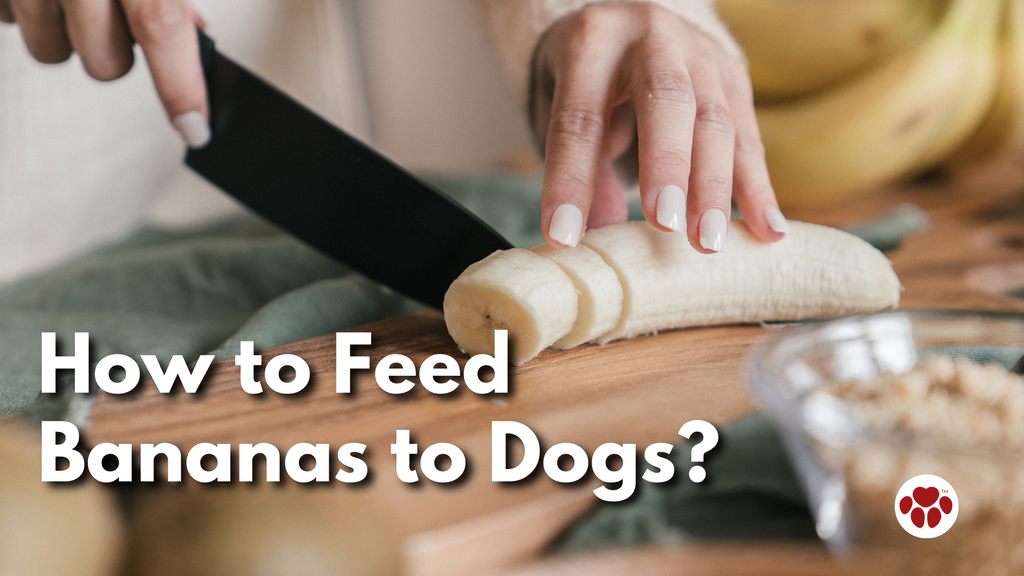
Regarding feeding bananas to dogs, it's essential to follow certain guidelines to ensure that they are served in a safe and healthy manner. Always remember to remove the peel before giving the banana to your furry friend.
The peel can be hard for them to digest and may pose a choking hazard if given as is. Cut the bananas into smaller, bite-sized pieces for your dog to eat easier and reduce the risk of any digestive issues. Consider mashing or pureeing the banana before offering it to your pet, especially for older dogs or those with dental problems.
Moreover, research indicates that bananas can be safely included in a dog's diet, both as a part of a protein-limited diet for anemic dogs and as a healthy treat in the form of biscuits (Zahra, 2021) or direct consumption, without adverse effects on the dog's health.
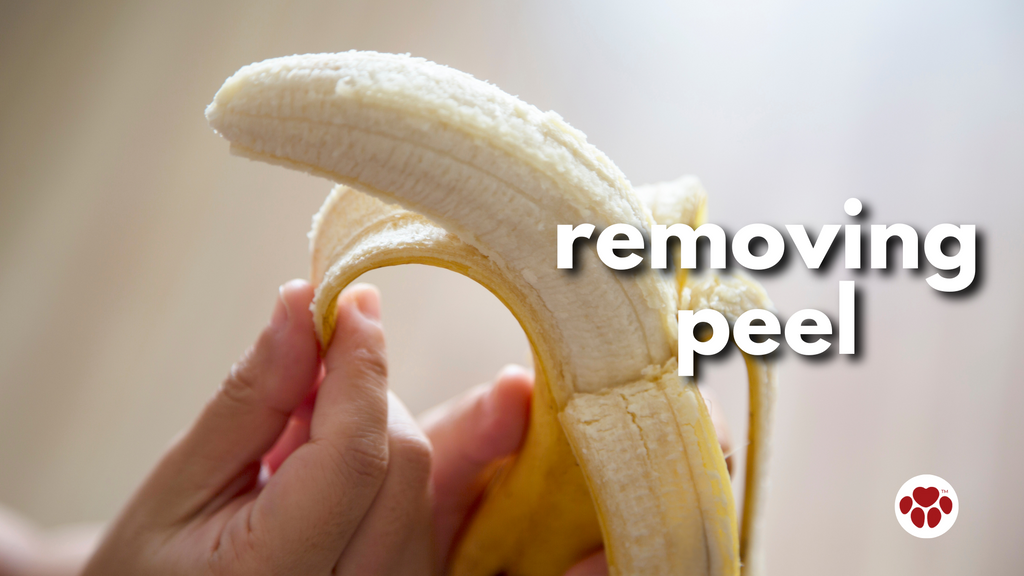
The peel can be difficult for dogs to digest and may pose a choking hazard and intestinal blockage. To ensure your dog enjoys fresh bananas safely, always peel the fruit and offer only the fleshy part. This way, you can provide a tasty and healthy treat without putting your dog at risk of digestive problems or choking hazards.
Nevertheless, banana peels have been used in the preparation of dog biscuits, which were found to be nutritionally adequate and acceptable to dogs, indicating that bananas can be a safe and nutritious treat for dogs (Zahra, 2021)
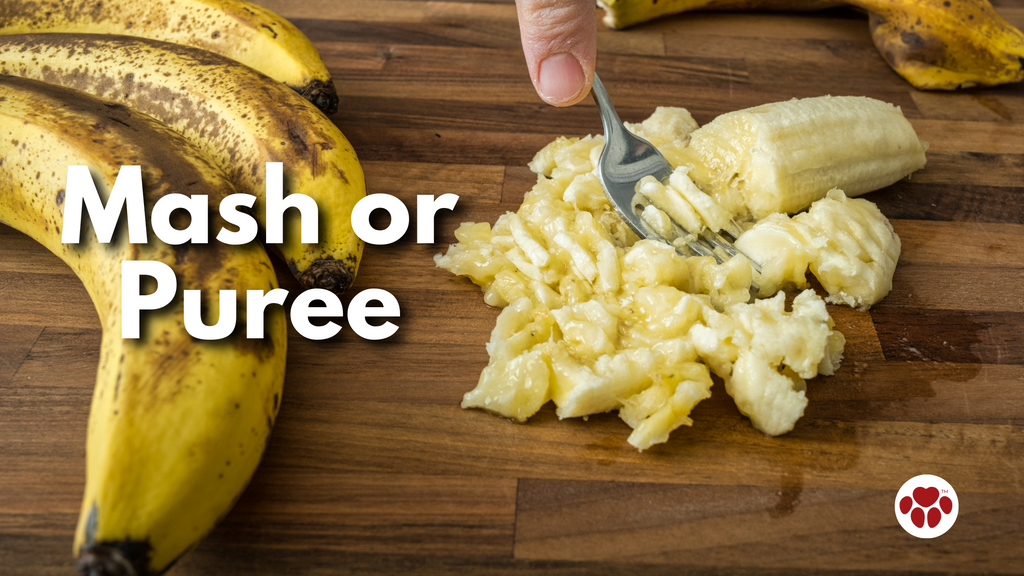
To make bananas more palatable for dogs, consider mashing or pureeing them to create a smoother texture that is easier for dogs to consume. When bananas are mashed or pureed, their natural sugars are released (de Souza et al, 2018), making them tastier for dogs.
This preparation method can also help enhance the digestibility of bananas for our canine companions. The smooth texture of mashed bananas can be particularly beneficial for older dogs or those with dental issues, as it reduces the risk of choking or difficulty in chewing. In addition, mashed bananas can be easily mixed into a dog's regular food, adding a healthy boost of vitamins and minerals to their diet. Read about "4 Ways CBD Can Help Improve Your Dog's Health Within Days!".
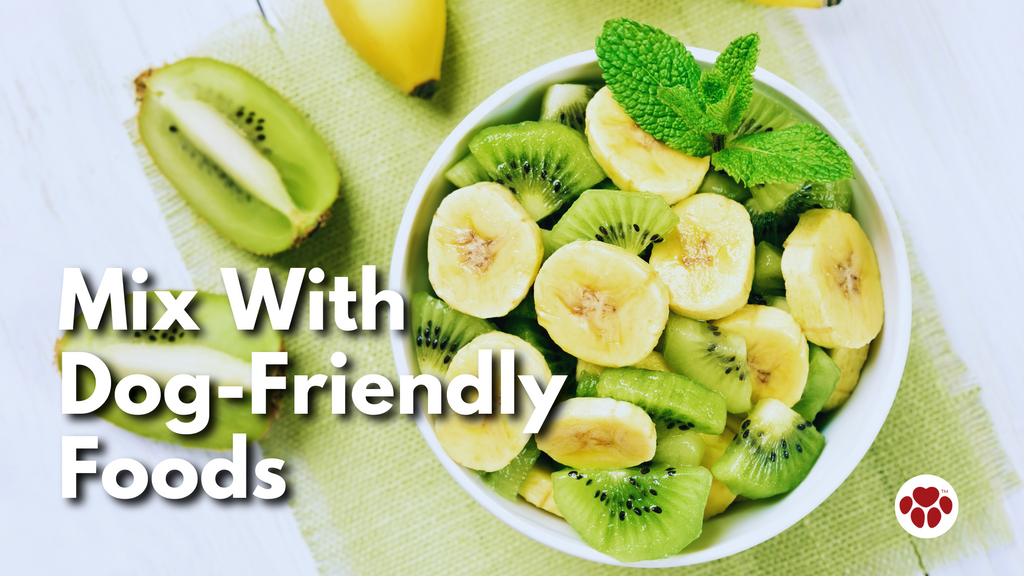
Incorporating bananas into a dog's diet can be enhanced by mixing them with other dog-friendly foods that complement the nutritional profile of bananas. For instance, combining bananas with plain yogurt can provide a good source of probiotics, aiding in digestion for your furry friend. Mixing bananas with natural peanut butter can offer a tasty and healthy treat rich in healthy fats and protein. Read about "Can My Dog Consume Peanut Butter?" and "Do Probiotics Really Help Your Dogs?".
To ensure a well-rounded diet, you can also incorporate bananas into homemade dog treats by baking them with oats and a small amount of honey for a natural sweetener.
This not only adds variety to their meals but also introduces new textures and flavors that can stimulate their palate. For more health benefits, you may also add a drop of CBD Happy-Furever™ Oil.

Bananas can serve as a nutritious treat or training reward for dogs, offering a healthy alternative to store-bought snacks that may contain unnecessary ingredients.
When used in training sessions, bananas can be sliced into small, bite-sized pieces for quick consumption, making them a convenient and enticing reward for good behavior. Check "Dog Training Tips: Do's and Don'ts".
For a fun twist, you can freeze banana slices for a refreshing treat on hot days or blend them into homemade dog-friendly smoothies. You can also cover a piece of CBD Happy-Furever™ Chews with mashed banana for healthier treats!
Just remember to feed bananas in moderation, as they are high in natural sugars that can cause digestive issues if consumed excessively.
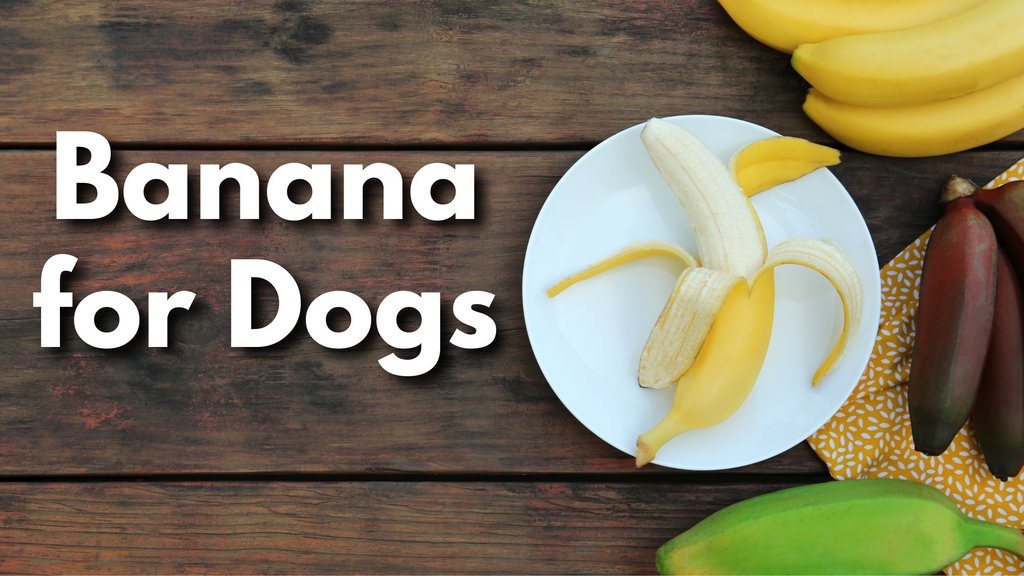
Bananas can be a safe and beneficial addition to a dog's diet when fed in moderation and following proper guidelines.
Feeding bananas to dogs provides a good source of vitamins and minerals, including potassium and Vitamin C, which can help support their overall health and immune system. The fiber in bananas can aid in digestion for your furry friend.
It is crucial to remember that every dog is different, and it's recommended to consult with a veterinarian before introducing any new foods to your pet's diet to ensure it aligns with their specific nutritional needs.
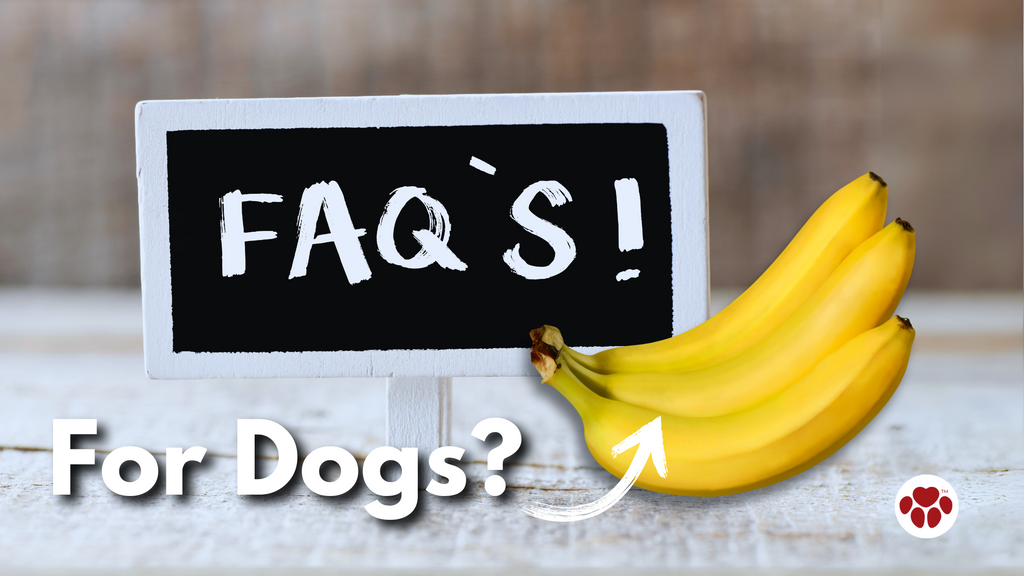
Yes, dogs can have bananas in moderation as they are a great source of vitamins and minerals.
No, bananas are not toxic to dogs. However, too much of it can cause stomach upset and diarrhea.
No, fresh banana peels are not toxic to dogs but they can be difficult for them to digest and may cause gastrointestinal blockage. They could also carry some harmful organisms.
Bananas should be given to dogs in small amounts as a treat or mixed in with their regular food. It is important to remove the peel and cut the banana into small, bite-sized pieces.
Yes, bananas are a good source of potassium, vitamin C, and fiber for dogs. They can also help with digestive health and promote a shiny coat.
Yes, puppies can have bananas in moderation as they can provide them with essential nutrients. However, it is always best to consult with your veterinarian before introducing any new food to your puppy's diet.


